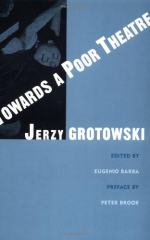
|
| Name: _________________________ | Period: ___________________ |
This quiz consists of 5 multiple choice and 5 short answer questions through Skara Speech.
Multiple Choice Questions
1. The body should appear how in the warm-up exercises from "Actor's Training (1959 - 1962)"?
(a) Restrained.
(b) Weightless.
(c) Leaden.
(d) Focused.
2. Where does the action of "Akropolis" take place in the text?
(a) A ship.
(b) A Cracow cathedral.
(c) A Spanish cathedral.
(d) A prison.
3. Grotowski says in "Skara Speech" that he has underlined the fact through the workshop that there are no impulses or reactions without _____.
(a) Thought.
(b) Emotion.
(c) Physicality.
(d) Contact.
4. What does Grotowski say "are always based on the transcendence of rules" in "Theatre is an Encounter"?
(a) Failures.
(b) Masterpieces.
(c) Musicals.
(d) Commercial successes.
5. Where did Grotowski reset "Akropolis"?
(a) A military prison.
(b) A dirt road.
(c) A scientist's laboratory.
(d) A concentration camp.
Short Answer Questions
1. What does Grotowski compare the text to in "Theatre is an Encounter"?
2. What did the actors wear in the production of "Akropolis"?
3. In one exercise from "Actor's Training (1959 - 1962)", the actor is to jump onto a chair. Where does the jump come from in the body?
4. What is at the core of theatre and performance, according to Grotowski in "Theatre is an Encounter"?
5. It is the task of _____ to amplify the carrying power of sound emitted in the actor.
|
This section contains 214 words (approx. 1 page at 300 words per page) |

|




